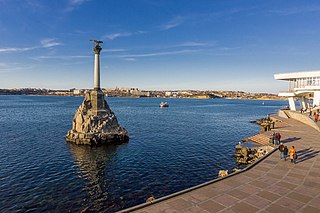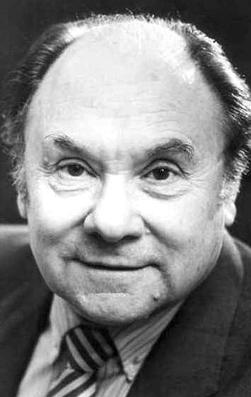
Sevastopol, sometimes written Sebastopol, is the largest city in Crimea and a major port on the Black Sea. Due to its strategic location and the navigability of the city's harbours, Sevastopol has been an important port and naval base throughout its history. Since the city's founding in 1783 it has been a major base for Russia's Black Sea Fleet. During the Cold War of the 20th century, it was a closed city. The total administrative area is 864 square kilometres (334 sq mi) and includes a significant amount of rural land. The urban population, largely concentrated around Sevastopol Bay, is 479,394, and the total population is 547,820.

Yury Nikolayevich Grigorovich is a Soviet and Russian dancer and choreographer who dominated the Russian ballet for 30 years.

Georgy Aleksandrovich Tovstonogov was a Russian-Georgian theatre director.

Alisa Brunovna Freindlich is a Russian actress. Since 1983, Freindlich has been a leading actress of the Bolshoi Drama Theater in Saint Petersburg, Russia. She was awarded the title of the People's Artist of the USSR in 1981.

Tatiana Vasilyevna Doronina is a popular Soviet and Russian actress who has performed in movies and the theater. She is generally regarded as one of the most talented actresses of her generation and was named a People's Artist of the USSR in 1981.

Yakov Lazarevich Kazyansky is a Russian pianist and composer. In 1994 he was awarded the title of Honoured Worker of Culture of the Russian Federation.

Kirill Yuryevich Lavrov was a Soviet and Russian stage and film actor and director. People's Artist of the USSR (1972), Hero of Socialist Labour (1985), Order of Lenin recipient (1985) and People's Artist of Ukraine (2003).

Oleg Ivanovich Borisov was a Soviet and Russian stage and film actor. People's Artist of the USSR (1978).

Yuri Sergeevich Lavrov was a well-known Soviet Russian film and theatre actor designated People's Artist of the USSR and People's Artist of Ukraine (1948).

Tovstonogov Bolshoi Drama Theater, formerly known as Gorky Bolshoi Drama Theater (1931–1992), often referred to as the Bolshoi Drama Theater and by the acronym BDT, is a theater in Saint Petersburg, that is considered one of the best Russian theaters. The theater is named after its long-time director Georgy Tovstonogov. Andrey Moguchy was the artistic director of the theater in 2013–2023 years.

Maria Petrovna Maksakova was a Soviet opera singer, mezzo-soprano, a leading soloist in the Bolshoi Theatre (1923–1953), who enjoyed great success in the 1920s and 1930s, in the times often referred to as the golden age of Soviet opera. Maria Maksakova, the three times laureate of the Stalin Prize, was designated as a People's Artist of the USSR in 1971. The actress Lyudmila Maksakova is her daughter; singer and TV presenter Maria Maksakova Jr. her granddaughter.

Sergei Vytautovich Puskepalis was a Russian actor and theatre director. He is best known for his roles in the award-winning movies Simple Things (2006) and How I Ended This Summer (2010), both directed by Alexei Popogrebski. For his performances, he won a Nika Award for Best Actor in 2008, as well as a Silver Bear for Best Actor at the 60th Berlin International Film Festival in 2010.

Timofey Aleksandrovich Kulyabin is a Russian theater and opera director.

The Ivan Franko National Academic Drama Theater, located in Kyiv, was founded in 1920. It rightfully plays an important role in the history of Ukrainian culture. Real masters worked here and continue to delight their fans: actors, directors, composers, set designers. The repertoire is based on national and World Classics. You can watch performances both on the main stage and in the chamber. Each performance is a separate world, a variety of ways of artistic solution, and unusual Productions. Bohdan Benyuk, Anatoly Khostikoev, Ostap Stupka, Natalia Sumskaya work on the stage of this theater.

Katerýna Petrívna Chepúra is a Ukrainian theatrical director and social activist.

Nikolay Nikolaevich Trofimov was a Soviet and Russian theater and film actor. People's Artist of the USSR (1990).
Adolf Yakovlevich Shapiro is a Soviet, Latvian and Russian theater director, acting teacher, playwright and author. People's Artist of the Latvian SSR (1986), Merited Master of the Arts of the Russian Federation (2019), Laureate of the State Prize of the Latvian SSR (1987).

Igor Evgenievich Kraev or Ihor Evgenovich Kraiev, is a Ukrainian and Russian producer, music promoter, entrepreneur, founder and CEO of TopHit project, a music promotion platform and music chart authority for thousands of music artists and labels, 1200+ radio stations worldwide, mostly in Europe, Ukraine, Russia and the CIS.

Volkov Russian State Academic Theatre is the oldest drama theatre in Russia. It was founded in 1756. The building is located in the centre of Yaroslavl at 1 Volkov Square.

























